Reviews include Irena’s Vow, The Beast, and Before I Change My Mind.
Zaynê Akyol Talks Rojek and the Business of War
February 23, 2024
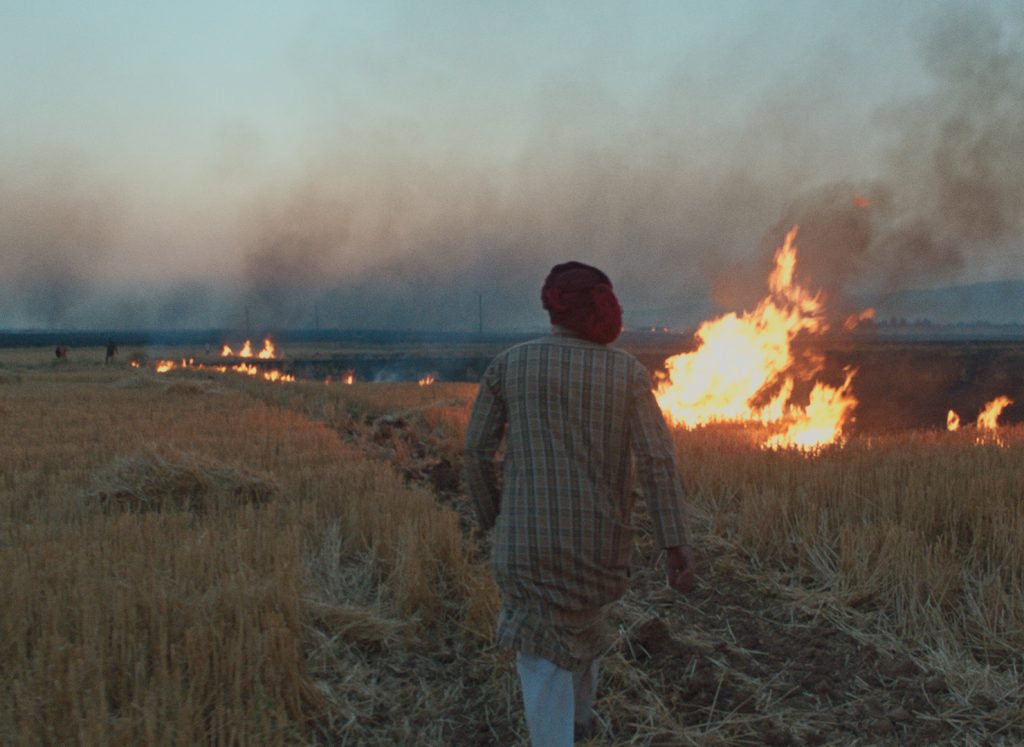
By Jason Gorber
Rojek is the latest film from Turkish born, Montreal-raised filmmaker Zaynê Akyol. The film is remarkable look at horrifying tales told by perpetrators of a particular brand of barbarism that soiled the sands of the Middle East over the last decades. A follow-up of sorts to her award winning film Gulîstan, Land of Roses (2016), which highlighted the female fighters of the PKK, or Kurdish Worker’s Party, in their battles with ISIS, Akyol returned to the region to interview members of ISIS who arrived from a wide variety of countries in order to help establish a new Caliphate and wage a holy war on both fellow Muslims and other cultures within Iraq, Syria, and the surrounding areas.
Akyol’s gift as a filmmaker is to present tales told by these hardened individuals with a deft level of journalistic distance, yet there’s never any sense of capitulation to their unwavering perspectives. As she allows them to speak, the individuals provide their own contradictory excuses for their actions. Akyol’s patient probing allows for deeper and darker truths to be expressed without need for histrionics.
Rojek premiered at the prestigious Visions du Réel festival, and was this year’s Oscar submission from Canada for the Best International Feature category. The film has achieved plenty of plaudits during its run, and has been selected by the TFCA as one of the three nominees for the Rogers Best Canadian Documentary prize, along with Chelsea McMullan’s Swan Song and Zack Russell’s Someone Lives Here. The winner receives $50,000, courtesy of Rogers, with runners-up each receiving $5,000. Prior to the March 4 Gala, I was extremely pleased to have the opportunity to engage in an extended conversation with Akyol over Zoom.
The following has been edited for clarity and concision.
Jason Gorber: Your film points out the fine line between doing an interview and doing an interrogation. Can you talk about working with people that on deep levels you disagree with their ideology, but want their story to be told from their perspective?
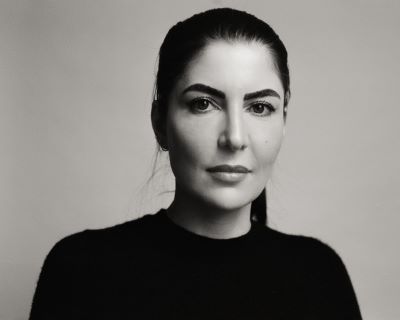
Zaynê Akyol: The subject is very personal to me because most of the people that I interviewed were directly or indirectly involved in the killing of the Kurdish women that I highlighted in Gulîstan, my first film. I knew that if I was to enter the conversation full of emotion in front of them, it wouldn’t be possible for them to open up. My goal was to understand how a human can find logical reason to think that killing another human being is OK, to understand the process of brainwashing. I cannot do this by sitting down and simply levelling accusations at them, or by opposing their way of thinking and remonstrating that it’s not correct. In their mind, they are the good guys! They’re coming from a completely different perspective. They think they are doing something that would allow them to practice their religion in a way that God wants them to practice.
In the beginning, I didn’t know that I would end up making this kind of film. I was visiting a lot of camps where the women and the kids were detained. They are huge: one held over seventy thousand people. It’s like a small town. I would see journalists coming there trying to do interviews with these women, and the journalists were so emotional and accusatory. They’re trying to get answers and failing. When you look from outside, you see how wrong it is, because it’s really someone [who is] brainwashed talking to another who has been brainwashed, and so any deeper communication or understanding is not going to happen that way. I then realized that to understand those people, you cannot ask them to understand your own point of view. You have to follow their thoughts, and try to find the question that is coming from their answers. You have to follow their path of thinking.
And yet there are people who will simply think you’re giving voice to these terrorists, making things worse by amplifying their views. Can you talk about how you navigate that sort of knee-jerk rejection?
I think if someone says that, it’s because they really don’t understand who I am and why I did this. First of all, I’m a Kurdish woman, and I filmed Kurdish women who fought these people who became prisoners. I sit in front of those people and try to understand, not in the sense that I am forgiving them. I think that’s a huge difference. When you forgive someone, it’s because they recognize they did something wrong. That doesn’t happen in the film. I’m not trying to give a voice to their ideology, but I’m trying understand how the brainwashing worked so you’re able also to imagine how we can find solutions as a society. That was my way of thinking when I did this film. I thought if I could understand how they are justifying their killing, why they are justifying it, and how this happened to them, I can somehow find solutions and talk about the solutions.
But really, this film was, for me, a grieving process. I was there at the beginning of the war in 2014 when they attacked the Kurdish region. I saw a lot of death, a lot of orphans, a lot of Kurdish women who had been raped, and listening to that testimony. If someone thinks that I am merely giving a voice to them, I think they don’t understand my approach.
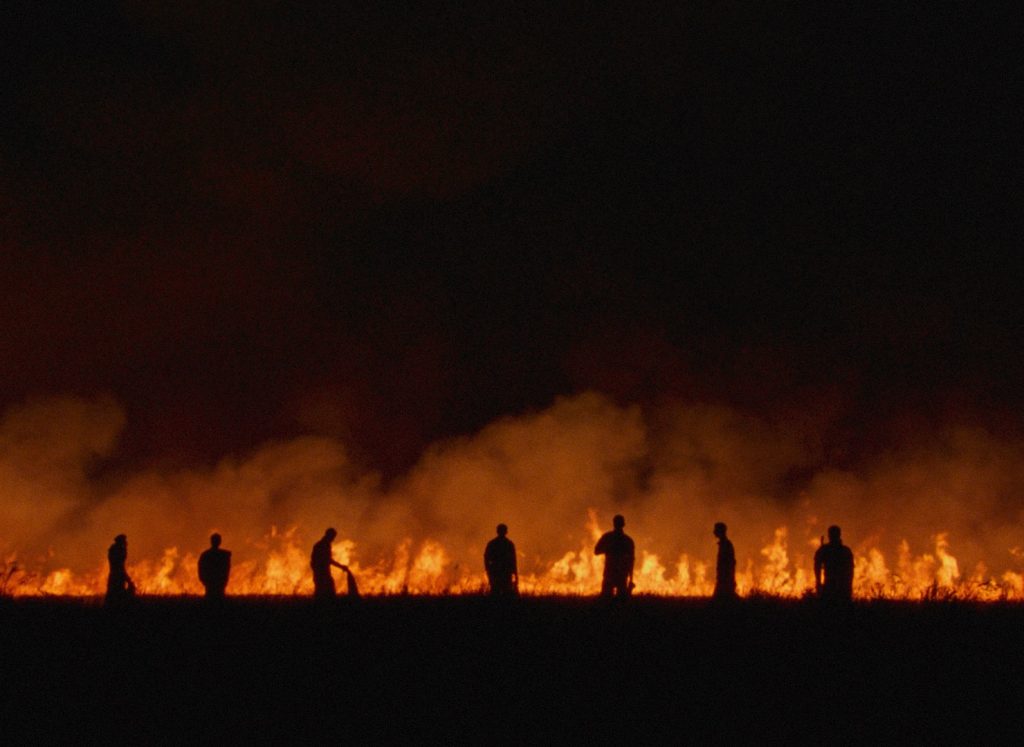
We see in them their thoughts and their mentalities while still being able to recognize the inappropriateness. It is a non-dehumanizing way of looking at these people and their choices, and if we were in that environment, maybe we would have such dark and broken thoughts as well.
It gives a human face to the monster that we imagine. In 2014, everything was full-on propaganda and videos of killings to scare people off. After the battles, it’s strange to suddenly witness how ordinary they are at the end of the day.
There’s another film that deals with similar issues that has gotten plenty of attention this year, Four Daughters. I spoke to Kaouther about films that she looked at when making it, and I referenced Joshua Oppenheimer’s Act of Killing. As a filmmaker, what energy do you get from movies like these? You’re living these awful experiences, but are there certain storytelling modes you’re able to glean from the works of others?
I think Oppenheimer’s a great filmmaker. I remember watching The Act of Killing when I was a student, and was fascinated by the film and the access he had. It broke a lot of rules that we thought it wasn’t possible to do in documentary. Suddenly, I remembered feeling that I had permission; that we could do whatever we wanted. When you’re a student, these films are so powerful creatively. It makes you realize how free you are as an artist, and you don’t have to imitate any style because it’s a documentary.
In Joshua’s case, he was not as directly and personally involved in the subjects, but for me, it was really hard. I was in the region for six months. It was, of course, hard physically: You can imagine that, in a war zone, you’re scared every day to be bombed. You don’t eat well, you don’t sleep well, you’re alone, etc. I didn’t have any fixer because I didn’t want to put anyone’s life in danger more than I already had. But in addition to that, I had to listen to these individuals talk about how they happily killed my people, as they explained how they are on the right path and how I’m wrong. I knew exactly that if I was not interviewing them at this moment and we were out on the streets they would flat-out kill me. It’s such a weird feeling, and very hard because their words were so violent, their energy is violent, their thoughts are violent.
Through the process I wanted to make sure I was in the right state of mind because they are very ordinary people when you first meet them. I forced myself to watch all of the [ISIS] propaganda videos that the Kurdish army had collected [remember] their actions. I’d be talking to this German guy who’s singing this Canadian song, and he’s comes across as sympathetic and joyful. In actuality, he beheaded ten people on camera. It’s strange how you are able to quickly forget because he comes across as ordinary, and you connect with him just as I am connecting with you right now. Sometimes you connect with people and you feel you’ve known them forever, and it also happens with criminals, which is so strange. You feel very weird.
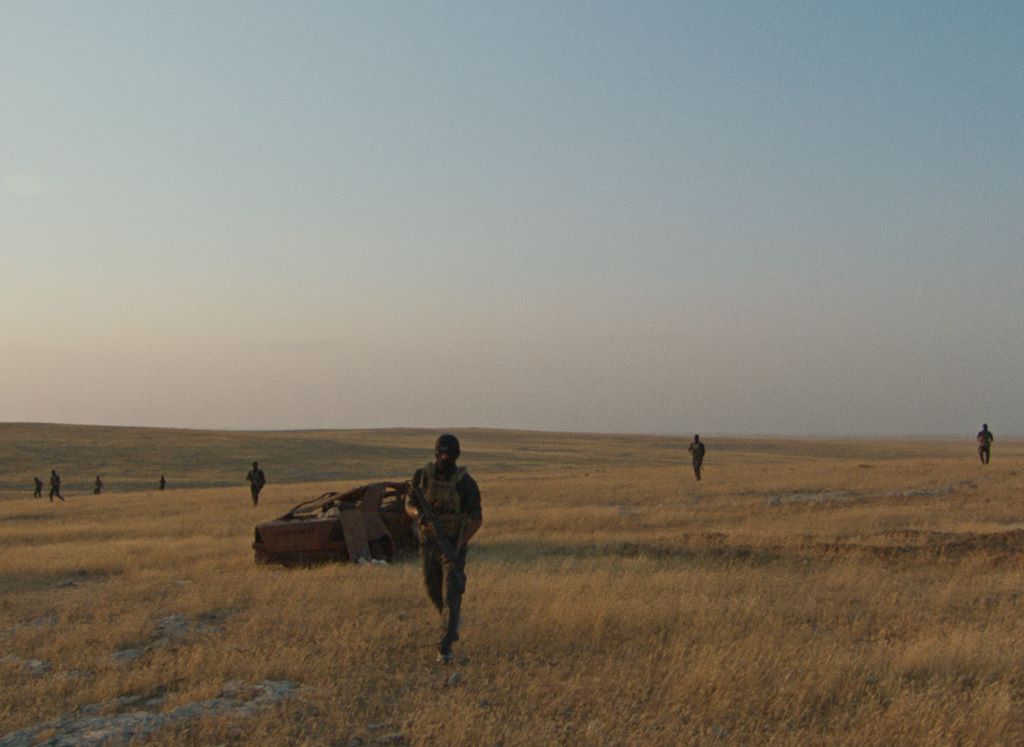
That’s exactly how we are made to feel as an audience when watching your movie. You are bringing us into the room with these individuals, and we are finding ourselves having those moments of sliding into the normalcy of it all. At some point in time, that must have been emotionally draining for you to leave the interview and enter this in-between liminal space.
True, but when you watch the film, you haven’t watched all of the videos that I saw. You don’t have the background that I had when I met them. I wanted to maintain the right approach and the right ethic, and the right distance, and ask the right questions. And because of that, I kind of tortured myself. I watched everything that I could after this first experience, when I realized I was feeling sympathy with this guy. Again, I know he would kill me if he could. I know that he hates everything that I am.
I watched all of these propaganda videos, and they were the most violent videos that you could see. It’s showing people in cages that they are putting into water, or firing at people, using kids to behead soldiers, putting dead bodies in the truck and just going in the town with bodies just [tumbling] around. It was very hard emotionally. Yes, you feel that there is a distance, and yes, you feel that I’m asking questions in a very neutral way. I’m not cold to them, and I’m not very friendly with them, I think I could keep the right distance, but certainly, during the filming, it’s not what the film is.
I could make a film about the making of this film! The editing was also another challenging process as it was done during COVID. I was all alone, not seeing anyone, and watching this footage every day. I was sending to the translator getting back every word, so I was re-living the trauma again and again. When I finished this film, I was so happy that it was the end of it.
I grieved when I was doing this film, because every day I was learning that all these women that I had previously filmed were dying. As of today, there is only one who has survived. After making this film, I went through my grieving and now it’s the end of a chapter of my life. I’m happy I made this film, but I think I would do things differently if I had to do this again.
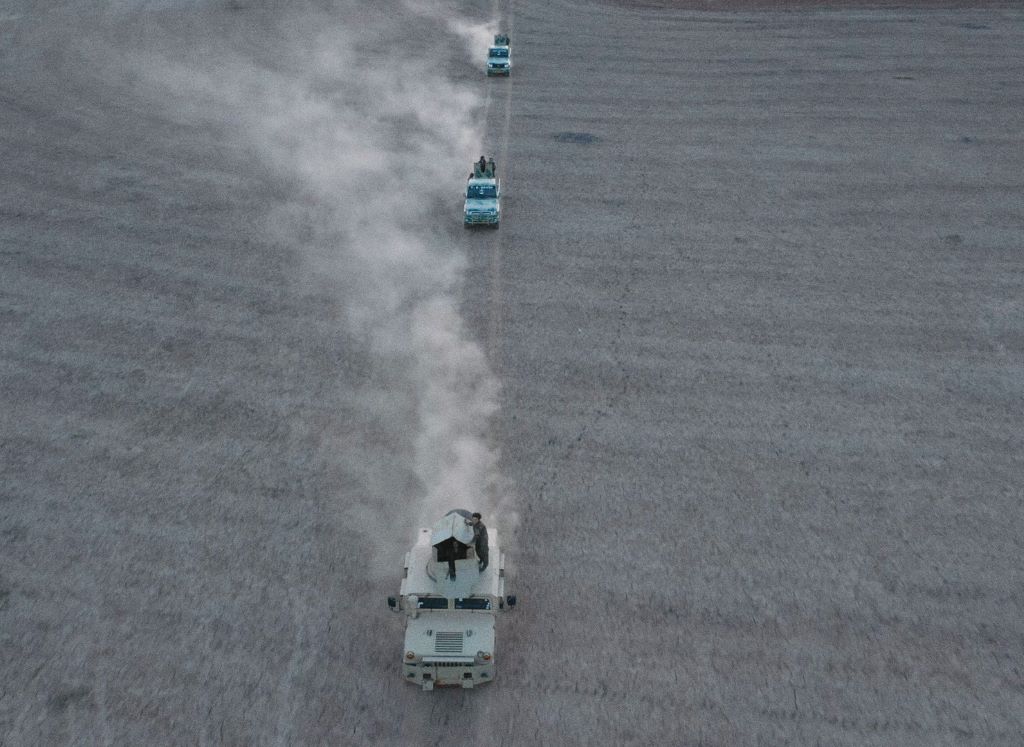
Can you be specific about what you might do differently?
I wouldn’t watch all of those videos because you cannot undo that horror. It’s always in my mind. I would probably try to have someone to help, a fixer on the ground who is used to war zones and would help me to think about the daily organization of filming. When you have to decide every day where you’re going to sleep, what you’re going to eat, is everyone ok, do we have this, even technically–it’s a lot of decision-making that makes your brain very tired. I kind of blacked out when I came back to Montreal after those six months. I’m OK now, but I would definitely do that differently.
Could you talk about those who did collaborate with you on the making of the film?
One collaborator is Nicolas Canniccioni. He is a well-known DoP here in Montreal and he’s done a lot of international films too. We were six months in the region, and for one full month we couldn’t cross the border. He filmed for two months in Syria. We had heavy, expensive equipment, and had a lot of backups. We had a second Canon 5D, we had a drone, and so on. When there you’re cut off from the world, we had everything doubled or tripled. We even had cash money that we had to carry, and there was a lot of technical difficulty. After Nicolas left, I continued shooting with Arshia Shakiba, who does everything. He’s from Toronto, and he recently moved to Montreal. Arshia used to edit, he did music videos for the Iranian community, and he used to do sound in Iran. I knew I needed someone like that, who could do anything that we needed to do. Arshia did the camera and the sound, and then I found a local who could be an assistant and we gave him a crash course of how to hold the boom. I was so lucky to have both Arshia and Nicolas in this region. For three years, I was looking for people who would go with me, and I couldn’t find any. I had the financing from Telefilm, but I couldn’t go because no one wanted to join me over there.
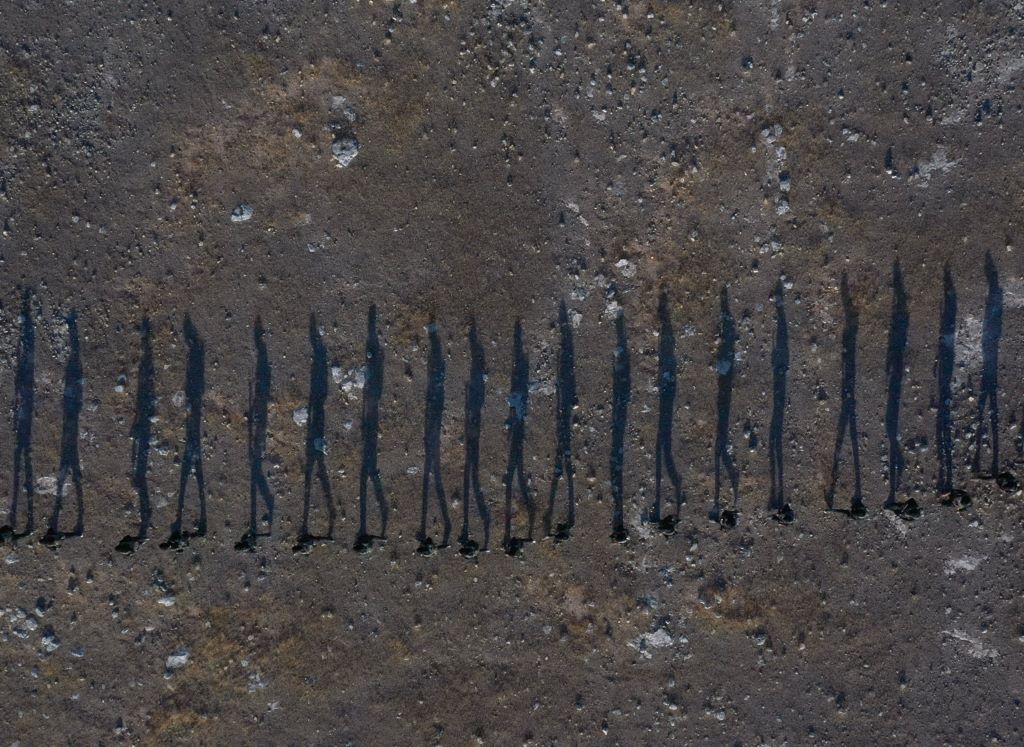
How did the Kurdish community there deal with the film? And how does the Kurdish community here deal with the film? I can see there very different responses from these communities.
That’s true. In Syria, they are so happy because they are saying, “Finally, people are seeing the evil that we are dealing with every day,” and that hopefully people will understand what a struggle it is for without any outside help. Everyone that I showed it to in Syria were extremely happy about the film and was resonating with them.
If we talk about people here, I think it depends on who you ask. Some people are very concerned, saying I shouldn’t have talked about ISIS, and I shouldn’t give these people a voice. Others are very happy and have the same reaction as the Kurdish people in Syria, that I don’t simply show ISIS members, but in doing so, see the larger struggle that has taken place for many years there. I didn’t have any very strong bad reaction, but I certainly had interesting discussions.
What does it mean to you to be selected as one of the top Canadian docs of the year by the Toronto Film Critics’ Association?
It means a lot. I really did this film for my grieving, and for understanding the people that I could never understand, and to face them. To give you a bit context, I was trying to understand where they fought, which battle they were in, and were they in the same fight that Sozdar, the woman in my previous film, was in. At first, I was simply trying to do my own investigation. After a while I just gave up on that idea, but that search informs the film. When you do such a personal work that is so physically and emotionally hard, you don’t think about festivals, you don’t think about being selected by the critics, you don’t think about receiving awards. Who wants to give an award to a film where you’re listening to bad people talking to you and making you feel uncomfortable? It’s not a feel-good movie. So suddenly, when I got all of these festival selections, awards, Oscar shortlisting, attention from critics, I don’t understand how that happened. I’m just happy and I’ll take it!
You obviously know what we are celebrating is you and your tenacity, and your bravery, and your ability to take us somewhere that maybe neither you, nor we, wanted to go, but we needed to go. Underneath the subject, it’s a technically good film—you shoot it well, you investigate it well, you edit it in a way which creates a level of drama. I think it’s easy to be overwhelmed by the subject matter and not recognize that there’s some truly exceptional filmmaking at play here.
I will take it because it was very hard to do. Most of the time, we had 15 minutes by [location] spot, because you had the sleeper cells everywhere. We had to be so fast. We were like ninjas! [Laughs.]. What you’re saying means a lot because we worked so hard in such a short time to construct meaningful shots.
After this journey, have you become more optimistic or less? What in the end did you personally learn from the experience?
I think I understand better this war and who was behind this war. I understand better even how the business of war works. There are a lot of things I couldn’t talk about within the film, but the process made me grow as a human being, as a woman, and also just understanding the world that I’m living in.
Rojek is available to stream on Crave and on VOD.
The winner for the Rogers Best Canadian Documentary will be revealed on March 4.



